Foods High in Iodine
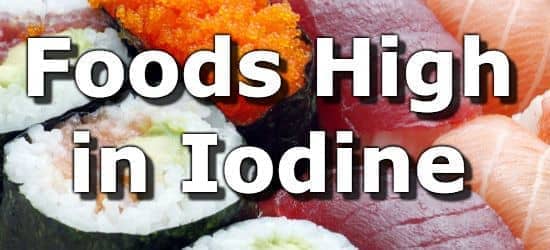
Iodine is a chemical element essential for the production of thyroid hormones that regulate growth and metabolism. (1)
Diets deficient in iodine increase the risk of retarded brain development in children (cretinism), mental slowness, high cholesterol, lethargy, fatigue, depression, weight gain, and goiter: a swelling of the thyroid gland in the neck. (2,3)
Please note that both too much and too little iodine can cause hypothyroidism, for more information, see the section on hypothyroidism. (4)
What foods are naturally high in iodine?
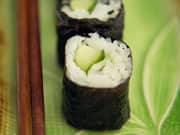
Iodine is a component of almost every living plant and animal. In general, foods from the sea contain the most iodine, followed by animal foods, then plant foods. Of all foods, seaweed (like kelp), is the most well-known and reliable source of natural iodine. Egg and dairy products can also be good sources.
Select Food Samples for Iodine Content
| Food | Serving Size | Iodine |
| Dried Seaweed | 1 gram | 16-2984mcg (11% - 1989% DV) |
| Cod | 3 ounces* | 99mcg (66% DV) |
| Iodized Salt (Fortified) | 1 gram | 77mcg (51% DV) |
| Baked Potato with peel | 1 medium | 60mcg (40% DV) |
| Milk | 1 cup (8 fluid ounces) | 56mcg (37% DV) |
| Shrimp | 3 ounces | 35mcg (23% DV) |
| Fish sticks | 2 fish sticks | 35mcg (23% DV) |
| Turkey breast, baked | 3 ounces | 34mcg (23% DV) |
| Navy beans, cooked | 1/2 cup | 32mcg (21% DV) |
| Tuna, canned in oil | 3 ounces (1/2 can) | 17mcg (11% DV) |
| Egg, boiled | 1 large | 12mcg (8% DV) |
How much iodine do I need?
In your entire lifetime you will need less than a teaspoon of iodine to ensure good health, however, since it is dangerous to consume that much iodine at once, it is best to eat a little each day. You only need 150 micrograms (mcg, mcg), or 20,000th of a teaspoon, to meet your daily requirement.
If iodine is in most plant and animal foods how can anyone be
deficient?
According to the World Health Organization, iodine deficiencies exist in 54
countries as of 2003.
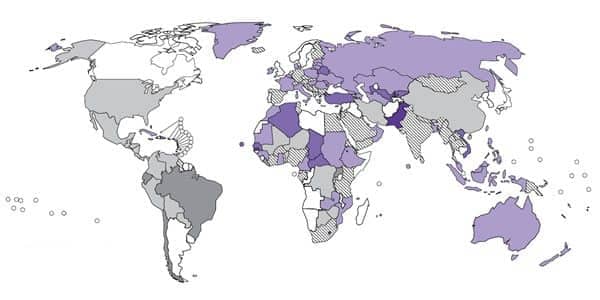 Map provided by the World Health Organization
Map provided by the World Health Organization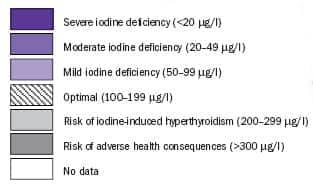
There is no exact answer as to why iodine deficiencies occur, however, two theories exist:
- People live in a part of the world with low levels of iodine in the soil or sea.
- People eat high amounts of refined foods that lose their iodine content during refinement. Refined sugar, for example, contains no iodine.
Some countries, like the U.S., show a risk of excess iodine intakes which suggests overconsumption of foods fortified with iodine, such as iodized salt.
Is too much iodine good or bad?
The tolerable upper intake for iodine is set at 1.1mg (1,100mcg) for adults 19 years and older. Risks of high iodine intake include hypothyroidism, hyperthyroidism, and goiter. Really acute iodine poisoning can lead to burning of the mouth, throat, and stomach, fever, abdominal pain, nausea, vomiting, diarrhea, weak pulse, and even coma. With that said, some studies suggest that intakes of iodine is up to 1.2mg (1,200mcg) per day, and can confer health benefits, including cancer protection. Japanese people get most of their iodine from kelp seaweed. Please consult your doctor before taking high doses of iodine, do so with caution, and for limited time periods.
Is there Iodine in Breast Milk?
New mothers should be aware that their breast milk contains iodine for their newborn children. The amount of iodine in breast milk will depend on the mother's diet. A 1984 sample of women from the United States found the average concentration of iodine excreted in breast milk to be 114mcg per day. This more than meets the adequate intake requirement of 110mcg per day for infants ranging 0-6 months, but falls a little short of the 130mcg per day requirement for infants ranging 7 months to 1 year. This should not necessarily be taken as a cause to eat a lot more iodine on the part of lactating women, as too much iodine can also be harmful.
I don't eat salt, meat, or seaweed, where can I get iodine?
Your options are to consider supplements, buy foods enriched in iodine, or ensure that the plant foods you consume come from parts of the world where the soil is rich in iodine.
I have hypothyroidism, can I consume iodine foods, or take iodine supplements?
Worldwide, iodine deficiency is the number one cause of hypothyroidism, however, iodine deficiency rarely causes hypothyroidism in the U.S. The only time you should consume iodine is if the cause of your hypothyroidism is from iodine deficiency, and even then, only consume moderate amounts. Note: Too little or too much iodine can cause hypothyroidism. Other causes of hypothyroidism include Hashimoto's disease, thyroiditis (inflammation of the thyroid), congenital hypothyroidism, surgical removal of part or all of the thyroid, radiation treatment of the thyroid, and some medications. If you have hypothyroidism from these causes, the U.S. National Institute of Health cautions that: "...taking iodine drops or eating foods containing large amounts of iodine - such as seaweed, dulse, or kelp - may cause or worsen hypothyroidism or hyperthyroidism." As such, only consume iodine in moderate amounts to maintain a proper level.
Related
Data Sources and References
- Schlienger JL, Goichot B, Grunenberger F. Iodine and thyroid disease Rev Med Interne. 1997;18(9):709-16. doi: 10.1016/S0248-8663(97)83750-2. 9365722
- Laurberg P, Jørgensen T, Perrild H, Ovesen L, Knudsen N, Pedersen IB, Rasmussen LB, Carlé A, Vejbjerg P. Iodine deficiency and thyroid disorders Eur J Endocrinol. 2006 Aug;155(2):219-28. doi: 10.1530/eje.1.02210. 16868134
- Hetzel BS. Iodine supplementation and the prevention of cretinism J Nutr. 2000 Feb;130(2S Suppl):493S-495S. doi: 10.1093/jn/130.2.493S. 10721937
- Farebrother J, Zimmermann MB, Abdallah F, Assey V, Fingerhut R, Gichohi-Wainaina WN, Hussein I, Makokha A, Sagno K, Untoro J, Watts M, Andersson M. Excess iodine intake: sources, assessment, and effects on thyroid function Thyroid. 2018 Sep;28(9):1198-1210. doi: 10.1089/thy.2018.0234. Epub 2018 Aug 22. 30019625
Simplify Nutrition Tracking with MyFoodData!
Speedy Tools and Detailed Data FREEEasily analyze your meals to find the best foods for your goals.
✅ Use our recipe nutrition calculator and nutrition comparison tool.
✅ Access expert nutrition data tools and in-depth articles.
✅ Log foods and organize your recipes with a free account.

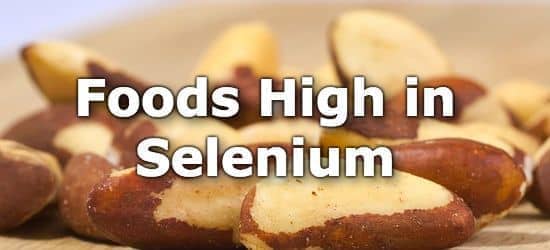 Next ➞
Next ➞
